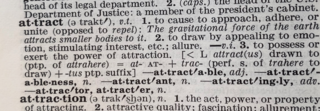Marriage
3 Ways That Faithful Partners Stay That Way
How to maintain monogamy given the inevitability of "attractive others" in life
Posted October 19, 2020 Reviewed by Matt Huston

Even those who are in a satisfying and committed relationship continue to be attracted to others. Romantic movies make it seem as if nobody can begin to break that bond if it is meant to be. Experiences in the early stages of a new relationship reinforce this view, too: Many people are so intensely focused on their partner that they simply don’t notice and aren’t distracted by attractive others.
But this phase of intense focus tends to peak early in an intimate relationship, at approximately six months, and gradually wanes over the following year. Not a bad thing. It means we move into a more comfortable and companionate phase of romantic love: less roller-coaster, more comfy couch.
Attractive others tend to become more salient again, however. Outside of that intense phase of passionate love (and sometimes even then), we are drawn automatically to those we find attractive. Neurophysiological research demonstrates that mere eye contact with an attractive person activates reward-related brain areas and prompts approach.
Researchers generally find that as the appeal of alternative partners increases, satisfaction with and commitment to one’s relationship decreases, even in relationships that have had high satisfaction and commitment. Infidelity is a primary reason why relationships break apart.

What can you do? We are often in situations in which we have to (or choose to) spend considerable amounts of time with attractive others. We typically spend more of our waking hours with others (e.g., our work colleagues) than we do with our romantic partners.
“Attractive others” can complicate our lives. Our research shows that most individuals (84%) say that they have an agreement with their partner to maintain monogamy, but over half (55%) have never talked directly with their partner about monogamy. The attractive other in one’s daily life proves a strong predictor of infidelity, often trumping even personality and relationship quality.
How then do couples successfully maintain monogamy given the inevitability of interacting with attractive others?
A promising area of research reveals that there are strategies used by those who have had long-term success in maintaining monogamy—a mixture of cognitive and behavioral responses when interacting with attractive others. They include:
1. Display fewer behavioral signs of attraction (e.g., mimicry, eye contact) when interacting with attractive others. In essence, do not communicate (even non-verbally) your attraction to someone by flirting or “being honest about your feelings” if you do not want to risk violating your agreement to be exclusive. Sure, you might want to connect with them sexually or romantically, but you can save it for fantasy (although see point 3 below). As fun as flirting can be, recognize this as a serious trip wire for many.
2. Use self-regulation resources (such as overriding thoughts about responding) to help exhibit low interest. Cue a classic scene from The Simpsons. Homer is in the elevator with Mindy, his attractive co-worker. He tells himself “Think unsexy thoughts! Think unsexy thoughts!” and focuses intently on some truly unappealing images.
Infidelity is a slippery slope. Recognize your own weak spots and prepare a few steps ahead. For example, if you know that you are inclined to flirt when you drink, don’t go for drinks to celebrate reaching a work goal together. If you are inclined to stray when you are separated by distance or travelling for work, recognize this vulnerability and plan ahead by checking in regularly with your partner, for instance. Staying in touch with an ex online might boost your self-esteem, but if it leaves you wanting more, then you need another outlet. You might need to specify a boundary to help regulate your interactions. This might be a "no touch" or "no drinking alone with this attractive other" rule.

3. A highly effective strategy (and one that can be taught) is to evaluate alternative partners less positively (even negatively). In psychology, this is called The Derogation Effect. Rather than focus on how funny or clever they are, or how great they look in that dress/shirt/wetsuit/uniform, focus instead on what you find unattractive about them (laughs too loud at their own jokes? corrects people's grammar? unibrow?). Middle-of-the-night fantasy about an attractive other might be harmless, but if it spills over into your day-to-day interactions, fantasy may constitute a risk for you. Deliberately shift your thoughts away. Focus on what is truly appealing about your partner and all that you gain with that relationship.
The bottom line is that infidelity typically does not “just happen” despite what we may tell ourselves. And it's easy to fall off course without any boundaries. Very easy. So, be brutally honest with yourself: Are you ready to leave or lose your relationship? If not, acknowledge that finding others attractive is mostly normal and positive, but also recognize your vulnerabilities, especially if you are spending extended time with someone attractive. The strategies above are a good starting point for staying on the straight and narrow.
Facebook image: eldar nurkovic/Shutterstock
References
Ferrey, A. E., Frischen, A., & Fenske, M. J. (2012). Hot or not: Response inhibition reduces the hedonic value and motivational incentive of sexual stimuli. Frontiers in Psychology, 3, 575.
Fisher, H. (2000). Lust, attraction, attachment: Biology and evolution of the three primary emotion systems for mating, reproduction, and parenting. Journal of Sex Education & Therapy, 25, 96-104.
Gibson, K., Thompson, A. E., & O’Sullivan, L. F. (2016). Love thy neighbor: Personality traits, relationship quality and attraction to others as predictors of infidelity. Canadian Journal of Human Sexuality, 25, 186-198
Johnson, D., & Rusbult, C. (1989). Resisting temptation: Devaluation of alternative partners as a means of maintaining commitment in close relationships. Journal of Personality and Social Psychology, 57, 967-980.
Kampe, K., Frith, C. D., Dolan, R. J., & Frith, U. (2001). Reward value of attractiveness and gaze. Nature, 413, 589-590.
Ritter, S. M., Karremans, J. C., & van Schie, H. T. (2010). The role of self-regulation in derogating attractive alternatives. Journal of Experimental Social Psychology, 46, 631-637.
Simpson, J. A, Gangestad, S. W, & Lerma, M. (1990). Perception of physical attractiveness: mechanisms involved in the maintenance of romantic relationships. Journal of Personality and Social Psychology, 59, 1192-1201.




